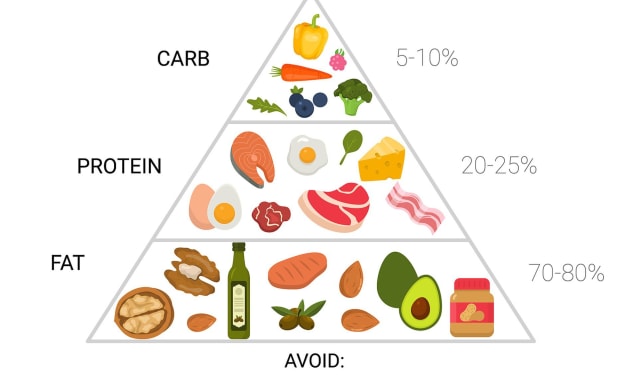The Ultimate Keto Meal Plan
Here's what we know

The ketogenic diet, commonly known as the "keto diet," is a low-carb, high-fat diet that has gained popularity in recent years as a weight loss and health improvement program. The basic idea behind the diet is to switch the body's primary source of fuel from carbohydrates to fat, putting the body into a metabolic state known as ketosis. In this state, the body burns stored fat for energy instead of glucose from carbohydrates.
One of the most appealing aspects of the keto diet is its flexibility. It allows for the consumption of high-fat foods such as cheese, butter, bacon, and avocados, which can make the diet feel less restrictive compared to other diets that may ban certain foods.
However, the keto diet also requires strict adherence to certain macronutrient ratios, typically 70-75% fat, 20-25% protein, and 5-10% carbohydrates. This can make it difficult for some individuals to stick to the diet long-term, as it may require significant changes to their eating habits and food choices.
The most significant benefits of the keto diet come from the fact that it forces the body to burn fat for energy. This can lead to rapid weight loss, especially in the first few weeks of the diet. Additionally, the high-fat content of the diet can lead to increased satiety, reducing the need to snack between meals and helping people to stick to their caloric goals.
In terms of overall health, the keto diet has been shown to have potential benefits for several medical conditions, including epilepsy, type 2 diabetes, and certain types of cancer. For example, the diet has been used successfully for decades to control seizures in children with epilepsy, and research has shown that it may improve insulin sensitivity and glycemic control in individuals with type 2 diabetes.
However, it is important to note that the long-term effects of the keto diet on overall health and disease management are still uncertain and require further study. The diet may also have some potential negative side effects, such as increased cholesterol levels, decreased athletic performance, and nutrient deficiencies.
One of the biggest challenges of the keto diet is sticking to it long-term. The strict macronutrient ratios and limitations on certain food groups can make it difficult for some individuals to stick to the diet, especially as it may require significant changes to their eating habits. Additionally, the diet may not be suitable for everyone, and individuals with certain medical conditions such as liver or kidney disease should speak with their doctor before starting the diet.
In conclusion, the keto diet can be an effective weight loss and health improvement program for some individuals. However, it requires strict adherence to specific macronutrient ratios and may not be suitable for everyone. Additionally, the long-term effects of the diet on overall health and disease management are still uncertain and require further study. As with any diet or lifestyle change, it is important to speak with a healthcare professional before starting the keto diet to determine if it is right for you.
Ketogenic diets for diabetes and prediabetes
Diabetes is characterized by changes in metabolism, high blood sugar, and impaired insulin function (20Trusted Source).
The ketogenic diet can help you lose excess fat, which is closely linked to type 2 diabetes, prediabetes, and metabolic syndrome.
One older study found that the ketogenic diet improved insulin sensitivity by a whopping 75%.
A small study in women with type 2 diabetes also found that following a ketogenic diet for 90 days significantly reduced levels of hemoglobin A1C, which is a measure of long-term blood sugar management.
Another study in 349 people with type 2 diabetes found that those who followed a ketogenic diet lost an average of 26.2 pounds (11.9 kg) over a 2-year period. This is an important benefit when considering the link between weight and type 2 diabetes.
What’s more, they also experienced improved blood sugar management, and the use of certain blood sugar medications decreased among participants throughout the course of the study.
For more information, check out this article on the benefits of low carb diets for people with diabetes.
SUMMARY
The ketogenic diet can boost insulin sensitivity and cause fat loss, leading to significant health benefits for people with type 2 diabetes or prediabetes.
Other health benefits of keto
The ketogenic diet actually originated as a tool for treating neurological diseases such as epilepsy.
Studies have now shown that the diet can have benefits for a wide variety of different health conditions:
Heart disease. The ketogenic diet can help improve risk factors like body fat, HDL (good) cholesterol levels, blood pressure, and blood sugar.
Cancer. The diet is currently being explored as an additional treatment for cancer, because it may help slow tumor growth.
Alzheimer’s disease. The keto diet may help reduce symptoms of Alzheimer’s disease and slow its progression.
Epilepsy. Research has shown that the ketogenic diet can cause significant reductions in seizures in epileptic children.
Parkinson’s disease. Although more research is needed, one study found that the diet helped improve symptoms of Parkinson’s disease.
Polycystic ovary syndrome. The ketogenic diet can help reduce insulin levels, which may play a key role in polycystic ovary syndrome.
Brain injuries. Some research suggests that the diet could improve outcomes of traumatic brain injuries.
However, keep in mind that research into many of these areas is far from conclusive.
Foods to avoid
Any food that’s high in carbs should be limited.
Here’s a list of foods that need to be reduced or eliminated on a ketogenic diet:
sugary foods: soda, fruit juice, smoothies, cake, ice cream, candy, etc.
grains or starches: wheat-based products, rice, pasta, cereal, etc.
fruit: all fruit, except small portions of berries like strawberries
beans or legumes: peas, kidney beans, lentils, chickpeas, etc.
root vegetables and tubers: potatoes, sweet potatoes, carrots, parsnips, etc.
low fat or diet products: low fat mayonnaise, salad dressings, and condiments
some condiments or sauces: barbecue sauce, honey mustard, teriyaki sauce, ketchup, etc.
unhealthy fats: processed vegetable oils, mayonnaise, etc.
alcohol: beer, wine, liquor, mixed drinks
sugar-free diet foods: sugar-free candies, syrups, puddings, sweeteners, desserts, etc.
SUMMARY
Avoid carb-based foods like grains, sugars, legumes, rice, potatoes, candy, juice, and even most fruits.
https://www.digistore24.com/redir/283755/MeruBoyKE/





Comments
There are no comments for this story
Be the first to respond and start the conversation.